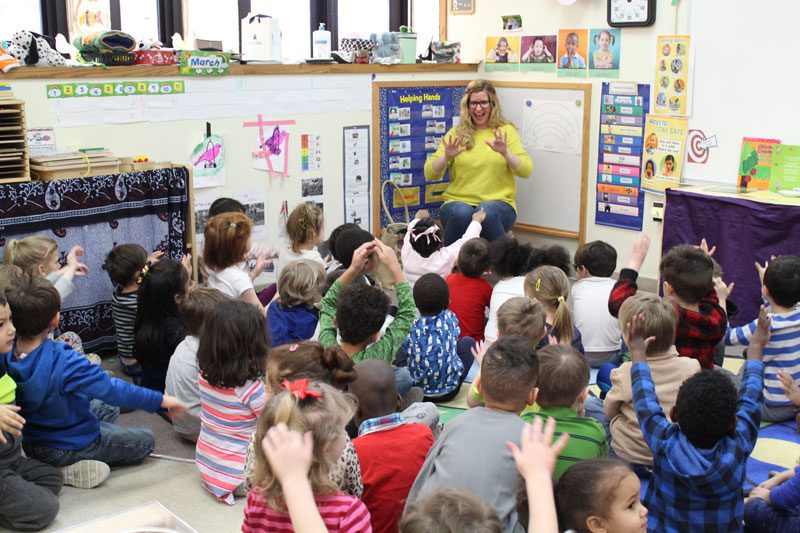When visiting local daycares and preschools, Children’s Outreach and Programming Specialist Jenny Jackson (pictured) always includes social and emotional concepts in her storytimes.
“What do you think ‘anxious’ is? Have you ever had butterflies in your tummy?” she asks as reads aloud to preschoolers in the PreKindergarten Partnership (PKP) classes at Longfellow Elementary, one of two state-funded early childhood program sites in Oak Park Elementary School District 97.
“I always want to address those concepts that many kids might not otherwise feel comfortable talking about with a grown-up,” Jackson says. “Or that they might not be able to even name yet.”
Why we support social & emotional learning
“At the library, we’ve realized one of the best ways we can support young children is by offering opportunities for social and emotional learning,” says Lori Pulliam, Director of Public Services and Programs. “Listening to experts and families themselves, we know this is an area of need across Oak Park.”
As the Collaborative for Academic, Social, and Emotional Learning defines it, social and emotional learning is “the process through which children and adults understand and manage emotions, set and achieve positive goals, feel and show empathy for others, establish and maintain positive relationships, and make responsible decisions.”
To support families both inside and outside the library, we’re continuing our dedicated Social-Emotional Learning Series and launching a new Community Empathy series this summer.
A whole-community approach
How do we, as a community, support our children in their earliest years, so they arrive at kindergarten ready to learn and develop to their fullest potential across their whole lives?
In 2016, the Collaboration for Early Childhood partnered with the Erikson Institute to study how young children in Oak Park are developing in five key areas.
Using the Early Development Instrument, kindergarten teachers in all eight Oak Park District 97 schools evaluated students’ ability to meet expectations in five areas: physical health, social competence, emotional maturity, language development, and communication skills.
Among early findings: across Oak Park, 27% of kindergarteners were not on track for emotional maturity, which includes helping others, tolerance, and empathy.
“All of our children are capable of greatness, as long as they are growing in an environment of people who support their progress,” says John Borrero, Collaboration for Early Childhood Executive Director.
“Beyond looking at individual children, we have to also look at neighborhoods and systems,” Borrero says. “In addition to supporting teachers, we have to support parents in their efforts to be partners. Similarly, a thoughtful investment in our children includes a view of educational outcomes that begins in early childhood and extends through the completion of a child’s academic career.”

